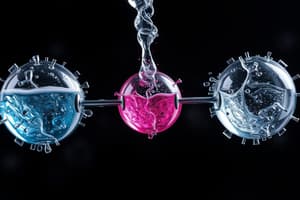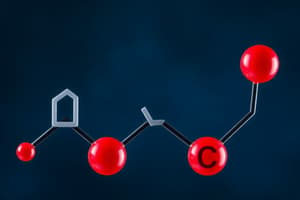Podcast
Questions and Answers
What is a chiral carbon?
What is a chiral carbon?
- A carbon with 3 different substituents
- A carbon with 4 different substituents (correct)
- A carbon in a ring structure
- A carbon with 4 identical substituents
Which of the following best describes enantiomers?
Which of the following best describes enantiomers?
- A type of diastereomer
- Molecules with chiral centers and non-superimposable mirror images (correct)
- Identical molecules
- Molecules that can freely rotate
What is a racemic mixture?
What is a racemic mixture?
Equal amounts of enantiomers
What defines a meso compound?
What defines a meso compound?
What occurs during electrophilic addition?
What occurs during electrophilic addition?
Describe the Bromination process.
Describe the Bromination process.
What is the physical state of trans-stilbene during bromination?
What is the physical state of trans-stilbene during bromination?
What is the physical state of cis-stilbene during bromination?
What is the physical state of cis-stilbene during bromination?
What is the procedure for brominating cis-stilbene?
What is the procedure for brominating cis-stilbene?
What terms are used to differentiate stereoisomers?
What terms are used to differentiate stereoisomers?
Study Notes
Key Concepts in Bromination of Alkenes
- Chiral Carbons: A carbon atom that has four different substituents, leading to the possibility of stereoisomerism.
- Enantiomers: Stereoisomers that are non-superimposable mirror images of each other, arising from chiral centers.
- Racemic Mixture: A mixture that contains equal amounts of two enantiomers, resulting in no optical activity.
Stereochemical Aspects
- Meso Compound: A molecule that contains chiral centers but also has an internal plane of symmetry, making it achiral overall.
- Erythro and Threo: Terms used to differentiate stereoisomers based on their spatial arrangement, important in discussing stereochemistry.
Mechanism of Bromination
- Electrophilic Addition: A process where a pi bond is converted into two sigma bonds; involves the formation of a carbocation intermediate after an electrophile attacks the alkene.
- Bromination: Involves the generation of a bromonium ion when bromine reacts with an alkene; results in formation of trans vicinal dihalides through an anti-addition mechanism, yielding chiral carbons with R or S configurations.
Specific Reactions
- Trans-Stilbene Bromination: A solid state reaction, highlighting the difference in physical properties in comparison to its cis counterpart.
- Cis-Stilbene Bromination: Occurs in a liquid state, indicative of the differences in reactivity of cis and trans alkenes.
- Cinnamic Acid Bromination: Another application of bromination that showcases variations in products based on the starting structure.
Experimental Procedure
- General Steps: Combine cis stilbene with acetic acid and bromine in a round bottom flask, reflux, then cool, add water, vacuum filter, and wash the product. Repeat with trans stilbene for comparative analysis.
- Silver Nitrate Results: Typically used for identifying the presence of bromine in reaction mixtures.
Yield and Analysis
- Percent Yield of Cis and Trans: Measurements that evaluate the efficiency of the bromination reaction for both isomers.
- Postlab and Prelab: Sections that typically involve analysis and preparatory work for conducting the experiment, encompassing safety, theoretical background, and expected outcomes.
Studying That Suits You
Use AI to generate personalized quizzes and flashcards to suit your learning preferences.
Description
Test your knowledge on key concepts related to the bromination of alkenes with these flashcards. Learn about chiral carbons, enantiomers, and other important terms in stereochemistry. Perfect for organic chemistry study and review.




